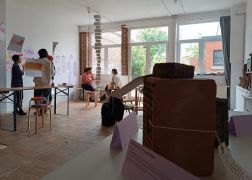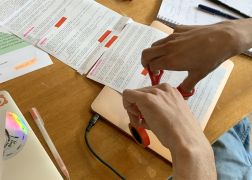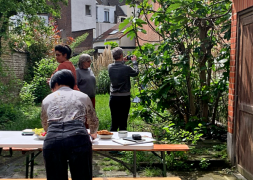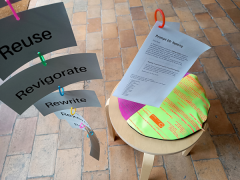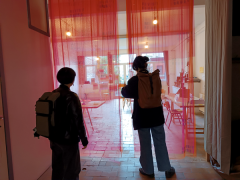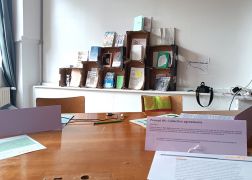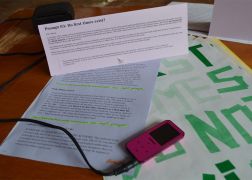Project Nodes: Difference between revisions
| (80 intermediate revisions by 3 users not shown) | |||
| Line 1: | Line 1: | ||
== | == Ecologies of Dissemination: Project Nodes == | ||
'''The Project Nodes section helps to navigate the layered map of multifaceted relationships and affinities between events, people, and concepts that form the ecologies for this issue.''' | |||
=== Authors of the Future === | |||
''[https://constantvzw.org/site/Authors-of-the-future-Re-imagining-Copyleft.html Authors of the Future]'' (Brussels, 2019) was a studyday organised by Constant. With contributions from Severine Dusollier (SciencesPo, Paris), Aymeric Mansoux (XPUB, Rotterdam), Eva Weinmayr (Pirate Library/AND Publishing, London) and Daniel Blanga Gubbay (KFDA, Brussels) it made a start with articulating and addressing some of the problems with and omissions in Free Culture licenses. Together with a group of participants, we wondered if we could invent licences that are based on collective creative practices, in which cooperation between machine and biological authors, need not be an exception. How could attribution be a form of situated genealogy, rather than accounting for heritage through listing names of contributing individuals? In what way can we limit predatory practices without blocking the generative potential of Free Culture? What would a decolonial and feminist license look like, and in what way could we propose entangled notions of authorship? Or perhaps we should think of very different strategies? | |||
== | === Collective Conditions for Reuse, 2020 (CC4r) === | ||
[https://constantvzw.org/wefts/cc4r.en.html Collective Conditions for reuse] (CC4r) is a collectively written document that can be included in any publication as a way to reorient conventional copyright. It is based on the Free Art Licence (FAL), but reformulates the position of the author as an individual, to recognize that authorship is "situated in social and historical conditions and that there may be reasons to refrain from release and re-use". In an important deviation from FAL and other Free Culture licences, it asks reusers to "take into account that the defaults of openness and transparency have different consequences in different contexts” and introduces the possibility of not-sharing. | |||
=== Collective Commitment to reuse, 2025 (CC2r) === | |||
The shift from ''condition'' to ''commitment'' has been proposed during the work session ''Revisit Reuse'' in an attempt to call for a commitment to practising in solidarity rather than relying on legal frameworks such as licences. This shift from conditions to commitment meant that we reformulated CC4r from a legal tool, with all its promises and problems, into a process, as ‘a ground from where to commit to’ as Castillo, one of the participants in the session, formulated it. | |||
=== First Times Do Not Exist === | |||
''[https://www.goteborgslitteraturhus.se/event/first-times-do-not-exist/ First Times Do Not Exist: Translating and citing as relational practices of re-use ]'' was an event that took place at Göteborg Literaturhuset in 2023. In conversation with translator Jennifer Hayashida, curator Nkule Mabaso and theoretician Cathryn Klasto, the convenors Eva Weinmayr and Femke Snelting attempted to rethink translation and citation as dispersed economies of reuse. We proposed that feeding, digesting, excreting, negotiating and transforming – citation and translation are knowledge ecologies where authorship is distributed, because a multiplicity of agents are at work to create a nutrient-rich milieu. The title is a quote by Cristina Rivera Garza (2020). The Restless Dead: Necrowriting and Disappropriation. Tennessee: Vanderbilt University Press (p 50). | |||
=== Limits to Openness Reading Group=== | |||
The monthly Reading Group ''[https://cryptpad.fr/pad/#/2/pad/view/yudC6c2AUWMqo1F2kFfYgl8HBR2PozNX5CmfEzJEBvQ/ Limits to Openness]'' took place online during 2023. Together with a diverse group of participants, we explored issues of universalism related to the idea of openness, as often presented in Open Content, Free Culture and dominant open access publishing. We selected texts, drawn from different fields, including philosophy, black studies, free culture, critical race studies, and critical IP. The texts were always contextualised through with a specific question. The reading group became a way to keep the path and the edges of the ''Ecologies of Dissemination'' research porous. It allowed others to enter, populate the research and to test or destabilize our assumptions. | |||
=== New Performative Practices === | |||
For two subsequent years, participants in the [https://www.uniarts.se/english/courses/master-programmes/new-performative-practices-master/ Master program for New Performative Practices](NPP) at Stockholm University of the Arts provided a stimulating context to work through ways that we can practice reuse while considering and challenging power relations, making communities thrive, and contributing to the pool of common knowledge. | |||
=== Revisit Reuse === | |||
Revisit Reuse was a small-scale exhibition and two day worksession that took place in Brussels, May 2024. It brought together questions and provocations addressing universalisms in Free Culture and Open Access and to build resources for collective practices of reuse. How to deal with issues of cultural appropriation, power differences and the limits of conventional citation and acknowledgment? | |||
The space and the exhibition were designed in collaboration with artist Flo*Souad Benaddi and included a series of prompts by Erri Ammonita, Bye Bye Binary, Séverine Dusollier, Andrea Francke, Gary Hall, Jennifer Hayashida, Cathryn Klasto, Nkule Mabaso, Nicolas Malevé, Dubravka Sekulić, Winnie Soon, Christopher Ba Thi Nguyen, Marloes de Valk and Stephen Wright. We also included a collection of cases that showed the complexities of reuse, and a library of materials published under the Collective Conditions for Reuse (CC4r), in collaboration with Constant. Flo*Souad Benaddi, Clara Bougon, Castillo, Sarah Magnan, Chae Kim, Cathryn Klasto, Gerrie van Noord, Femke Snelting, Litó Walkey, Eva Weinmayr took part in the worksession. | |||
<gallery mode="packed-hover"> | |||
File:Revisit-Reuse-Brussels08.jpg | |||
File:Revisit-Reuse-Brussels01.jpg | |||
File:Revisit-Reuse-Brussels02.png | |||
File:Revisit-Reuse-Brussels03.png | |||
File:Revisit-Reuse-Brussels04.png | |||
File:Revisit-Reuse-Brussels06.jpg | |||
File:Revisit-Reuse-Brussels07.jpg | |||
</gallery> | |||
=== Dissemination === | |||
In line with feminist methods, we think of dissemination in terms of the slow and growing, scattered ways connecting people and their concerns to the project. In that way, this issue of PARSE Journal is a temporary stabilisation within a multitude of processes and activities, such as the open reading groups, the work sessions, assemblies, formal interviews and informal conversations. | |||
Dissemination differs from distribution; distribution can be seen as a rather technical and controlled act of delivering an object from a central point to known targets. Instead, "dissemination [...] has the nuance of spreading amorphously or in an unstructured manner. It develops a life on its own with its temporalities and trajectories. Knowledge, for example, can in some way be disseminated, but hardly distributed. Dissemination's offer and scope is to propagate. Coming from Latin "semina," dissemination suggests the spreading of a seed through wind, insects or birds. There is not the expectation of an immediate or technical effect. It is an offer. Seeds take their time: once, when they find the right conditions, they germinate." (Weinmayr 2020) | |||
This multiplicity of agents and directions is also reflected in the title of this PARSE issue, "Ecologies of Dissemination". | |||
=== Decolonial feminist knowledge practices === | |||
== | |||
== | |||
Committing to decolonial feminist practices of reuse is also an attempt to make space for discomfort by acknowledging that the needs of different reusers might not align. By decentring the modernist concept of the author as a self-determined subject, decolonial feminist practices of reuse recognise authorial practice as a reciprocal and relational act of touching and being touched – of reusing and being reused. | |||
We decided to use both terms, ‘decolonial’ and ‘feminism’, first of all because too often feminisms have ignored and repressed the concerns and perspectives of racialised people. We hold on to ‘feminism’, following Maria Lugones (2010: 757) who reminds us that gender itself is a colonial construct and therefore not separable from coloniality. ‘One way of expressing this is that the coloniality of knowledge, for example, is gendered and that one has not understood the coloniality of knowledge without understanding its being gendered’. | |||
=== Radical Open Access === | |||
Under this heading, we point to the many forces of activism and scholarship currently at work within the Open Access movement. On the one hand, we observe how unregulated corporate power has enabled a handful of profit driven publishers to increase their market dominance through multiple strands of revenue, such as article processing charges (APC) and library licensing models (Kember, 2024:1). Since the APC-based business model relies on academic institutions providing funds, it tiggers tough institutional selection, competition and streamlining regimes that tend to exclude many scholars "due to their specialised focus, niche topic, experimental multimodal outlook, or their critical or radical character" (Adema & Moore, 2021: 30). In this situation, in an attempt to “opening out from open access towards a non-technocratic, post-neoliberal publishing ecology in which compliance, efficiency, transparency and competition give way to values such as integrity, justice, care and cooperation”(Kember (2024:2) lots of energy and organising goes into the formation of alternative networks and collectives. The [https://radicaloa.postdigitalcultures.org/|Radical Open Access Collective (ROAC)] was founded in 2016, as a way to build “mutual reliance” and resilience between the many and various scholar-led publishers that have emerged in the last decade(Adema and Moore, 2017). Other Collectives and initiatives, such as [http://www.copim.ac.uk | Community-led Open Publishing Infrastructures for Monographs (COPIM)], [http://scholarled.org | ScholarLed] are all in the process of building an alternative, small scale scholar-led OA publishing ecosystem, “that has global reach but preserves local contexts”. (Adema & Moore, 2021:40). | |||
The | See also: | ||
*Adema, Janneke & Moore, Samuel (2017). The Radical Open Access Collective: Building alliances for a progressive, scholar-led commons. LSE Impact Blog, 27 October. Available at: http://blogs.lse.ac.uk/impactofsocialsciences/2017/10/27/the-radical-open-access-collectivebuilding-alliances-for-a-progressive-scholar-led-commons | |||
*Adema, Janneke & Moore Samuel (2018) Collectivity and collaboration: Imagining new forms of communality to create resilience in scholar-led publishing. Insights, 31. DOI: https://doi.org/10.1629/uksg.399 | |||
*Adema, Janneke, & Moore, Samuel. A. (2021). Scaling Small; Or How to Envision New Relationalities for Knowledge Production. Westminster Papers in Communication and Culture, 16(1), 27–45. DOI: https://doi.org/10.16997/wpcc.918 | |||
*Hall, Gary (2024) The Pluriversal Politics of Radical Publishing's Scaling Small. http://www.garyhall.info/journal/2024/10/18/the-pluriversal-politics-of-radical-publishings-scaling-smal.html | |||
*Kember, Sarah (2024) "Householding" in ''Culture Machine'' journal Vol. 23 “Publishing after Progress” edited by Rebekka Kiesewetter. https://culturemachine.net/vol-23-publishing-after-progress/kember-householding/ | |||
*Kember, Sarah (2020), “Distributed Open Collaborative Scholarship”, in The Knowledge Futures Commonplace, March 15, 2020. DOI: 10.21428/6 d8432.fdf89d72 | |||
*Kiesewetter, Rebekka (2020). A New Genealogy for Critical OA Publishing: Towards a Politics of Intersectional Transnationality. Journal of International Women' s Studies, 21(7), 61-76. Available at: https://vc.bridgew.edu/jiws/vol21/iss7/6 | |||
*Kiesewetter, R. (2020). Undoing scholarship: Towards an activist genealogy of the OA movement. Tijdschrift Voor Genderstudies, 23(2), 113–30. DOI: https://doi.org/10.5117/TVGN2020.2.001.KIES | |||
*Kiesewetter, Rebekka, (2023) Reading Differently Expanding Open Access Definitions Towards Greater Knowledge Equity, doctoral thesis. Coventry University. https://pureportal.coventry.ac.uk/files/78391764/ReadingDifferently_Final_RebekkaKiesewetter_lib_1_.pdf | |||
=== Ecologies === | |||
For our use of the term Ecologies we turned to Karen Barad (2014) who provides the helpful metaphor of compost where the directional forces of in and out (distribution) turn into a multi-directional thicket of turning over and over again (dissemination). "We might imagine re-turning as a multiplicity of processes, such as the kinds earthworms revel in while helping to make compost or otherwise being busy at work and at play: turning the soil over and over – ingesting and excreting it, tunnelling through it, burrowing, all means of aerating the soil, allowing oxygen in, opening it up and breathing new life into it." Such kind of decentralizing ecology based on a multiplicity of agents could also help to rethink authorship as freed from ownership and distributed in economies of feeding, digesting, excreting, and transforming. | |||
== Free | === Free Art Licence === | ||
[https://artlibre.org/ The Free Art Licence] is a Free Culture licence created in 2000 in France, based on contributions from artists and legal scholars to the mailing list copyleft_attitude@april.org, including Melanie Clément-Fontaine, David Geraud, Isabelle Vodjdani, and Antoine Moreau. | |||
This particular licence has been an inspiring project because, in contrast with more mainstream projects such as Creative Commons, FAL maintains its enthusiasm for F/LOSS ideology and reformulates the interrelated mechanisms of “use, copy, distribute, transform, and prohibition of exclusive appropriation” in its own poetic way. The writing of this licence and the collective practising of its implications are part of an ongoing artistic project with explicit anti-capitalist politics. | |||
=== Free Culture === | |||
In this issue, we have used the term 'Free Culture' as a shortcut for the amalgamate of copyleft and open content initiatives, some in the domain of software and others in cultural production, for which Aymeric Mansoux proposes the acronym FLOCKEW (free/libre/open content/knowledge/expression/work). Of course Free Culture does not do justice to the many different ideological approaches gathered under the term, each hotly debated, ranging from Free Software (a social movement which insists on the rights of reusers to run, copy, distribute, study, change, and improve software), Open Source (fostering reuse as a practice, but not as an ideology), and Copyleft (insisting that derived works are released under a compatible copyleft license). | |||
See: Aymeric Mansoux, “How Deep is Your Source,” in Digital Art Conservation, Preservation of Digital Art: Theory and Practice, ed. Bernhard Serexhe (Karlsruhe: ZKM, 2012). | |||
=== Creative Commons licenses (CC) === | |||
https:// | [https://artlibre.org/ Creative Commons] (CC) licenses were introduced in 2002 and became the most used Open Content licenses that enable the free distribution of an otherwise copyrighted "work". A CC licence assumes a legal author, which then can give other people the right to share, use, and build upon a work that they claim. This licence is popular because of its flexibility, and because it allows individuals and large institutions to grant the public permission to use their creative work in a standardized way, while respecting conventional copyright law. There are several types of Creative Commons licences, and each licence differs by several combinations that condition the terms of distribution. CC can allow so-called authors for example to choose for only non-commercial uses of a given work. CC is helpful because it protects reusers who use or redistribute a work licensed with CC from concerns of copyright infringement as long as they abide by the conditions that are specified. | ||
Latest revision as of 11:21, 23 February 2025
Ecologies of Dissemination: Project Nodes
The Project Nodes section helps to navigate the layered map of multifaceted relationships and affinities between events, people, and concepts that form the ecologies for this issue.
Authors of the Future
Authors of the Future (Brussels, 2019) was a studyday organised by Constant. With contributions from Severine Dusollier (SciencesPo, Paris), Aymeric Mansoux (XPUB, Rotterdam), Eva Weinmayr (Pirate Library/AND Publishing, London) and Daniel Blanga Gubbay (KFDA, Brussels) it made a start with articulating and addressing some of the problems with and omissions in Free Culture licenses. Together with a group of participants, we wondered if we could invent licences that are based on collective creative practices, in which cooperation between machine and biological authors, need not be an exception. How could attribution be a form of situated genealogy, rather than accounting for heritage through listing names of contributing individuals? In what way can we limit predatory practices without blocking the generative potential of Free Culture? What would a decolonial and feminist license look like, and in what way could we propose entangled notions of authorship? Or perhaps we should think of very different strategies?
Collective Conditions for Reuse, 2020 (CC4r)
Collective Conditions for reuse (CC4r) is a collectively written document that can be included in any publication as a way to reorient conventional copyright. It is based on the Free Art Licence (FAL), but reformulates the position of the author as an individual, to recognize that authorship is "situated in social and historical conditions and that there may be reasons to refrain from release and re-use". In an important deviation from FAL and other Free Culture licences, it asks reusers to "take into account that the defaults of openness and transparency have different consequences in different contexts” and introduces the possibility of not-sharing.
Collective Commitment to reuse, 2025 (CC2r)
The shift from condition to commitment has been proposed during the work session Revisit Reuse in an attempt to call for a commitment to practising in solidarity rather than relying on legal frameworks such as licences. This shift from conditions to commitment meant that we reformulated CC4r from a legal tool, with all its promises and problems, into a process, as ‘a ground from where to commit to’ as Castillo, one of the participants in the session, formulated it.
First Times Do Not Exist
First Times Do Not Exist: Translating and citing as relational practices of re-use was an event that took place at Göteborg Literaturhuset in 2023. In conversation with translator Jennifer Hayashida, curator Nkule Mabaso and theoretician Cathryn Klasto, the convenors Eva Weinmayr and Femke Snelting attempted to rethink translation and citation as dispersed economies of reuse. We proposed that feeding, digesting, excreting, negotiating and transforming – citation and translation are knowledge ecologies where authorship is distributed, because a multiplicity of agents are at work to create a nutrient-rich milieu. The title is a quote by Cristina Rivera Garza (2020). The Restless Dead: Necrowriting and Disappropriation. Tennessee: Vanderbilt University Press (p 50).
Limits to Openness Reading Group
The monthly Reading Group Limits to Openness took place online during 2023. Together with a diverse group of participants, we explored issues of universalism related to the idea of openness, as often presented in Open Content, Free Culture and dominant open access publishing. We selected texts, drawn from different fields, including philosophy, black studies, free culture, critical race studies, and critical IP. The texts were always contextualised through with a specific question. The reading group became a way to keep the path and the edges of the Ecologies of Dissemination research porous. It allowed others to enter, populate the research and to test or destabilize our assumptions.
New Performative Practices
For two subsequent years, participants in the Master program for New Performative Practices(NPP) at Stockholm University of the Arts provided a stimulating context to work through ways that we can practice reuse while considering and challenging power relations, making communities thrive, and contributing to the pool of common knowledge.
Revisit Reuse
Revisit Reuse was a small-scale exhibition and two day worksession that took place in Brussels, May 2024. It brought together questions and provocations addressing universalisms in Free Culture and Open Access and to build resources for collective practices of reuse. How to deal with issues of cultural appropriation, power differences and the limits of conventional citation and acknowledgment?
The space and the exhibition were designed in collaboration with artist Flo*Souad Benaddi and included a series of prompts by Erri Ammonita, Bye Bye Binary, Séverine Dusollier, Andrea Francke, Gary Hall, Jennifer Hayashida, Cathryn Klasto, Nkule Mabaso, Nicolas Malevé, Dubravka Sekulić, Winnie Soon, Christopher Ba Thi Nguyen, Marloes de Valk and Stephen Wright. We also included a collection of cases that showed the complexities of reuse, and a library of materials published under the Collective Conditions for Reuse (CC4r), in collaboration with Constant. Flo*Souad Benaddi, Clara Bougon, Castillo, Sarah Magnan, Chae Kim, Cathryn Klasto, Gerrie van Noord, Femke Snelting, Litó Walkey, Eva Weinmayr took part in the worksession.
Dissemination
In line with feminist methods, we think of dissemination in terms of the slow and growing, scattered ways connecting people and their concerns to the project. In that way, this issue of PARSE Journal is a temporary stabilisation within a multitude of processes and activities, such as the open reading groups, the work sessions, assemblies, formal interviews and informal conversations.
Dissemination differs from distribution; distribution can be seen as a rather technical and controlled act of delivering an object from a central point to known targets. Instead, "dissemination [...] has the nuance of spreading amorphously or in an unstructured manner. It develops a life on its own with its temporalities and trajectories. Knowledge, for example, can in some way be disseminated, but hardly distributed. Dissemination's offer and scope is to propagate. Coming from Latin "semina," dissemination suggests the spreading of a seed through wind, insects or birds. There is not the expectation of an immediate or technical effect. It is an offer. Seeds take their time: once, when they find the right conditions, they germinate." (Weinmayr 2020)
This multiplicity of agents and directions is also reflected in the title of this PARSE issue, "Ecologies of Dissemination".
Decolonial feminist knowledge practices
Committing to decolonial feminist practices of reuse is also an attempt to make space for discomfort by acknowledging that the needs of different reusers might not align. By decentring the modernist concept of the author as a self-determined subject, decolonial feminist practices of reuse recognise authorial practice as a reciprocal and relational act of touching and being touched – of reusing and being reused.
We decided to use both terms, ‘decolonial’ and ‘feminism’, first of all because too often feminisms have ignored and repressed the concerns and perspectives of racialised people. We hold on to ‘feminism’, following Maria Lugones (2010: 757) who reminds us that gender itself is a colonial construct and therefore not separable from coloniality. ‘One way of expressing this is that the coloniality of knowledge, for example, is gendered and that one has not understood the coloniality of knowledge without understanding its being gendered’.
Radical Open Access
Under this heading, we point to the many forces of activism and scholarship currently at work within the Open Access movement. On the one hand, we observe how unregulated corporate power has enabled a handful of profit driven publishers to increase their market dominance through multiple strands of revenue, such as article processing charges (APC) and library licensing models (Kember, 2024:1). Since the APC-based business model relies on academic institutions providing funds, it tiggers tough institutional selection, competition and streamlining regimes that tend to exclude many scholars "due to their specialised focus, niche topic, experimental multimodal outlook, or their critical or radical character" (Adema & Moore, 2021: 30). In this situation, in an attempt to “opening out from open access towards a non-technocratic, post-neoliberal publishing ecology in which compliance, efficiency, transparency and competition give way to values such as integrity, justice, care and cooperation”(Kember (2024:2) lots of energy and organising goes into the formation of alternative networks and collectives. The Open Access Collective (ROAC) was founded in 2016, as a way to build “mutual reliance” and resilience between the many and various scholar-led publishers that have emerged in the last decade(Adema and Moore, 2017). Other Collectives and initiatives, such as | Community-led Open Publishing Infrastructures for Monographs (COPIM), | ScholarLed are all in the process of building an alternative, small scale scholar-led OA publishing ecosystem, “that has global reach but preserves local contexts”. (Adema & Moore, 2021:40).
See also:
- Adema, Janneke & Moore, Samuel (2017). The Radical Open Access Collective: Building alliances for a progressive, scholar-led commons. LSE Impact Blog, 27 October. Available at: http://blogs.lse.ac.uk/impactofsocialsciences/2017/10/27/the-radical-open-access-collectivebuilding-alliances-for-a-progressive-scholar-led-commons
- Adema, Janneke & Moore Samuel (2018) Collectivity and collaboration: Imagining new forms of communality to create resilience in scholar-led publishing. Insights, 31. DOI: https://doi.org/10.1629/uksg.399
- Adema, Janneke, & Moore, Samuel. A. (2021). Scaling Small; Or How to Envision New Relationalities for Knowledge Production. Westminster Papers in Communication and Culture, 16(1), 27–45. DOI: https://doi.org/10.16997/wpcc.918
- Hall, Gary (2024) The Pluriversal Politics of Radical Publishing's Scaling Small. http://www.garyhall.info/journal/2024/10/18/the-pluriversal-politics-of-radical-publishings-scaling-smal.html
- Kember, Sarah (2024) "Householding" in Culture Machine journal Vol. 23 “Publishing after Progress” edited by Rebekka Kiesewetter. https://culturemachine.net/vol-23-publishing-after-progress/kember-householding/
- Kember, Sarah (2020), “Distributed Open Collaborative Scholarship”, in The Knowledge Futures Commonplace, March 15, 2020. DOI: 10.21428/6 d8432.fdf89d72
- Kiesewetter, Rebekka (2020). A New Genealogy for Critical OA Publishing: Towards a Politics of Intersectional Transnationality. Journal of International Women' s Studies, 21(7), 61-76. Available at: https://vc.bridgew.edu/jiws/vol21/iss7/6
- Kiesewetter, R. (2020). Undoing scholarship: Towards an activist genealogy of the OA movement. Tijdschrift Voor Genderstudies, 23(2), 113–30. DOI: https://doi.org/10.5117/TVGN2020.2.001.KIES
- Kiesewetter, Rebekka, (2023) Reading Differently Expanding Open Access Definitions Towards Greater Knowledge Equity, doctoral thesis. Coventry University. https://pureportal.coventry.ac.uk/files/78391764/ReadingDifferently_Final_RebekkaKiesewetter_lib_1_.pdf
Ecologies
For our use of the term Ecologies we turned to Karen Barad (2014) who provides the helpful metaphor of compost where the directional forces of in and out (distribution) turn into a multi-directional thicket of turning over and over again (dissemination). "We might imagine re-turning as a multiplicity of processes, such as the kinds earthworms revel in while helping to make compost or otherwise being busy at work and at play: turning the soil over and over – ingesting and excreting it, tunnelling through it, burrowing, all means of aerating the soil, allowing oxygen in, opening it up and breathing new life into it." Such kind of decentralizing ecology based on a multiplicity of agents could also help to rethink authorship as freed from ownership and distributed in economies of feeding, digesting, excreting, and transforming.
Free Art Licence
The Free Art Licence is a Free Culture licence created in 2000 in France, based on contributions from artists and legal scholars to the mailing list copyleft_attitude@april.org, including Melanie Clément-Fontaine, David Geraud, Isabelle Vodjdani, and Antoine Moreau.
This particular licence has been an inspiring project because, in contrast with more mainstream projects such as Creative Commons, FAL maintains its enthusiasm for F/LOSS ideology and reformulates the interrelated mechanisms of “use, copy, distribute, transform, and prohibition of exclusive appropriation” in its own poetic way. The writing of this licence and the collective practising of its implications are part of an ongoing artistic project with explicit anti-capitalist politics.
Free Culture
In this issue, we have used the term 'Free Culture' as a shortcut for the amalgamate of copyleft and open content initiatives, some in the domain of software and others in cultural production, for which Aymeric Mansoux proposes the acronym FLOCKEW (free/libre/open content/knowledge/expression/work). Of course Free Culture does not do justice to the many different ideological approaches gathered under the term, each hotly debated, ranging from Free Software (a social movement which insists on the rights of reusers to run, copy, distribute, study, change, and improve software), Open Source (fostering reuse as a practice, but not as an ideology), and Copyleft (insisting that derived works are released under a compatible copyleft license).
See: Aymeric Mansoux, “How Deep is Your Source,” in Digital Art Conservation, Preservation of Digital Art: Theory and Practice, ed. Bernhard Serexhe (Karlsruhe: ZKM, 2012).
Creative Commons licenses (CC)
Creative Commons (CC) licenses were introduced in 2002 and became the most used Open Content licenses that enable the free distribution of an otherwise copyrighted "work". A CC licence assumes a legal author, which then can give other people the right to share, use, and build upon a work that they claim. This licence is popular because of its flexibility, and because it allows individuals and large institutions to grant the public permission to use their creative work in a standardized way, while respecting conventional copyright law. There are several types of Creative Commons licences, and each licence differs by several combinations that condition the terms of distribution. CC can allow so-called authors for example to choose for only non-commercial uses of a given work. CC is helpful because it protects reusers who use or redistribute a work licensed with CC from concerns of copyright infringement as long as they abide by the conditions that are specified.
